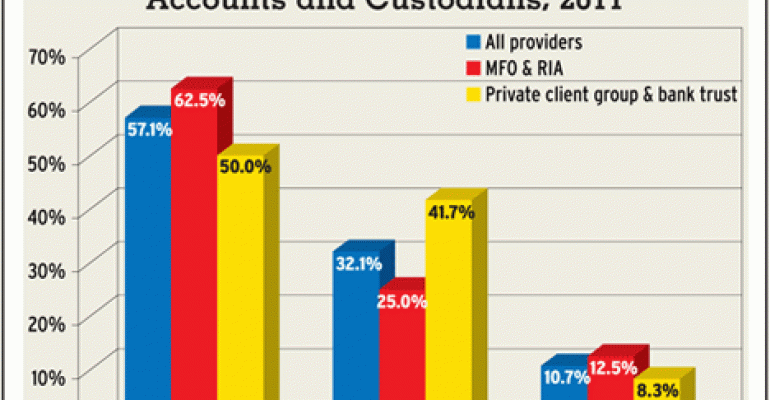Add one more winner to last week’s blockbuster LPL-Fortigent deal: the rapidly growing business of providing outsourcing services to wealth managers.
“LPL’s acquisition of Fortigent deal is a validation of the space and everything those companies are doing,” said David DeVoe, the former Schwab executive who now heads his own consulting firm, DeVoe & Co. in San Francisco. “It’s a sign that growth is accelerating and that the industry continues to win.”
Indeed, industry executives and analysts estimate that the assets serviced by companies who provide performance reporting, rebalancing, data aggregation, manager search, due diligence and other related turnkey asset management platform (TAMP) functions has roughly doubled since 2007.
In the last two years alone, assets at Wilton, Conn.-based Private Client Resources have risen 300 percent to over $60 billion, according to president and chief executive officer Robert Fiore. In 2011, the number of client firms serviced by Marrietta, Ga.-based Interactive Advisory Software grew to nearly 200, a 40 percent jump, said chief executive John Philpott.
And strong demand from wealth managers who are increasingly outsourcing infrastructure and asset management needs has pushed the total platform assets of Envestnet, one of the industry’s biggest players, past $127 billion, said Bill Crager, president of the Chicago-based firm.
“We’ve seen the need for outsourcing on asset management skyrocket since 2007,” Crager said. “Advisors have had to add new asset classes in areas they are not expert in and portfolios have become far more complex. Industry-wide growth has been astronomical as a result.”
Outsourcing firms have also benefitted from the crisis of confidence in the markets following the market crash of 2008 and high-profile scandals personified by Bernard Madoff’s Ponzi scheme, according to Fiore.
“There’s been a surge in the need for transparency since 2008,” Fiore said. “Everyone is demanding superior reporting and really clean data. And during the financial crisis advisors re-focused on their primary business of providing advice to clients and managing relationships. They got out of secondary businesses like aggregation and reporting, which is why you’re seeing such substantial growth in outsourcing.”

Growth Seen Continuing
That growth is expected to continue, say industry experts.
“Outsourcing is a very hot sector that advisors are going to continue to turn to and big companies are going to continue to look at entering,” said Robert Testa, senior analyst for Cerulli Associates. “RIAs have limited staffs and it’s difficult for them to conduct manager searches, do due diligence and administer all the operations. Reporting is a particular pain point for them and they’re looking for integrated solutions.”
Nonetheless, Fiore estimates that 70 percent of advisors continue to do reporting and data aggregation in-house, obviously leaving much room for market expansion.
Established players in the field will have an advantage, said Elizabeth Nesvold, managing partner for New York-based investment banking firm Silver Lane Advisors, which advised Fortigent in the LPL deal.
“It’s a huge organic growth opportunity for established companies, but will be much harder for new entrants,” Nesvold said. “It’s a business that requires capital, technology, the right people and time to establish a brand. Those who are already in have a great head start.”
That’s good news for TAMP companies like Advent (which purchased tech standout Black Diamond Performance reporting last year), Callan Associates, RockIt Solutions, SEI, Prima Capital, Adhesion Wealth Advisor Solutions, WealthTouch, Genworth, Tamarac and Orion Advisor Services, as well as Envestnet, Interactive Advisory Software and Private Client Resources.
Challenges for LPL and Fortigent
But the market remains fragmented and many expect consolidation in the next few years. What’s more, all eyes will be on Fortigent and LPL.
Fortigent is expected to benefit from LPL’s deep pockets and stability, while LPL stands to gain from Fortigent’s strong market position among advisors with high and ultra-high-net-worth clients.
But the marriage also carries risks.
Some clients are fearful that Fortigent will lose the boutique quality that made the firm so attractive in the first place. “I love Fortigent the way they are now, but I’m worried that they’ll get dumbed down,” said one client who did not want to be identified.
Other observers cite the risk of cultural, personality and strategic clashes in the future.
“Anytime there’s a transaction there’s a risk of what may happen in the future,” said DeVoe, who specializes in mergers and acquisitions and headed Schwab Advisor Services. “Management may do something different than what was generally expected.”






